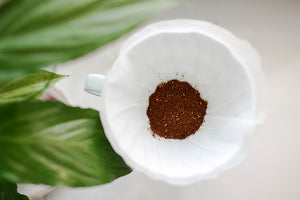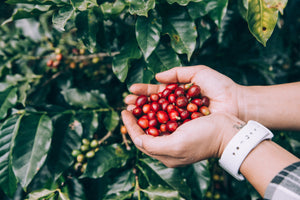
Beans to Pods - Speciality Coffee Capsules
A few weeks ago we got to taste Colonna Coffee’s speciality Nespresso compatible coffee capsules at their London launch at Curators Coffee in Fitzrovia. Suddenly their importance came into focus. What Maxwell has created is a coffee delivery device that is fully accessible to the customer and a neat way to allow people to experiment with flavours at home and develop their own preferences.
Back in March, Toby Henderson and Dominique Lim attended a talk for us on the possibility of pods and came away intrigued. Maxwell Colonna-Dashwood, three time UK Barista Champion was keen to persuade a slightly skeptical but intrigued speciality coffee audience of value of capsule coffee. The coffee they produce is subtly different to espresso, not as intense but a brew method in its own right. We’d argue the process suits medium roasts and citrusy, floral and fruit tones. A more accessible espresso for many and a way in to appreciating filter coffee.
We met some of our customers at Curators around the same time as the launch, and were struck by how many had access to Nespresso machines. A large proportion of customers don’t own grinders but can access coffee this way. It was exciting to see customers buying boxes of pods and swapping varieties with each other. What do we want more than to see many more people making great coffee at home and continuing their own coffee journeys? How this quite squares with a public that mostly enjoys coffee with steamed milk puzzles us, but Nespresso have shown that a lack of barista standard steamed milk at home has been no impediment to sales. We saw a great home milk steamer at the launch event but it’s not something we’ve looked into.
Recently, we enjoyed a range of delicious coffee pods from Colonna and also a great Brazil natural from Pact. What Colonna and Pact are doing is taking different but complementary paths and we would recommend either of these roasters’ capsules. Pact have decided to focus on a traditional and accessible Brazil natural espresso for their first foray into the pod market – allowing for a drink that will have a wide appeal while maintaining great quality.
The Pact pods we tried, Sertao Natural, come stunningly packaged like a box of chocolates and arrived replete with pod tips, advice for recycling and, best of all, a small card with a visual guide to flavour notes (in this case dark chocolate, cherry and almond – very accurately) and a guide to pronunciation of Sertao Natural; with all the information you might ever want on the reverse including a quote from the farmers Jose Isidrio Pereira and Nazereth Diaz Pereira. A creamy mouthfeel came close to the expected espresso texture and the flavour was full and chocolatey with none of the bitter aftertaste of commodity pods. The Sertao Natural pods are £14.95 for 40, available here. We ordered the ‘short’ version and generally preferred these – setting our Nespresso machine to put out 25g per shot. Pact also have a Christmas Blend available in pod version,
If the Pact pods were like a box of chocolates, the Colonna pods were like a fruit salad. Colonna choose four coffees at a time to feature and classify the pods as ‘foundation’, ‘discovery’ ‘rare’ and ‘decaf’. We particularly enjoyed a Nano Challa that closely matched flavour notes of tinned peaches and earl grey, the Colonna roasting and Nespresso process bringing out the best of a juicy washed Ethiopian coffee. Las Nubes from El Salvador was another favourite – more chocolatey but with delicious plum notes in the finish. Hartmann Maragogype from Panama was elegant, as was Candelilla Geisha from Costa Rica. Do you see the potential here? Anyone can enjoy and compare great coffees from around the world in seconds with a device that is practically plug and play.
We rarely taste decaffeinated coffee but the Santa Isabel from Guatemala was very enjoyable, and we are looking forward to an as yet unopened box of Pirineos red honey from El Salvador which promises marzipan, black cherry and chocolate. As you might notice, Colonna provide a lot less information about their coffees than PACT but surely hope that interested customers will be motivated to find out more. Capsules are £22 for 40 on Colonna’s website or £34 for 40 for rare coffees. Subscriptions and taster packs are also available. Curators Coffee have a range of Colonna capsules available to buy at prices from £5.50 to £8.50 for ten. That’s 85p a cup for a geisha coffee at home. The Black Chapel also stock the Colonna capsules. You can buy any coffee in long or short versions – experiment! Colonna roast and grind the coffee to suits either the short or long process
Machine-wise, we are using a borrowed Inissia by Magimix that works very well. That currently retails at John Lewis for £65. We used Waitrose Essentials water and we programmed out machine for 25g and 65g. There are great instructions for how to do this here. It also has essential instructions on warming your machine and keeping it clean between shots. It’s worth noting that the only machine Colonna found incompatible with their capsules was the Citiz.
Colonna’s roasted coffee is some of the best we taste in the UK and we’d recommend their beans and the best of PACT’s coffees are as good as anything on the market. Maxwell’s capsule coffee project, like PACT’s aims to grant access to the marvels of the coffee world to a wider audience while maintaining the highest standards of quality. Once encapsulated – the coffee remains as fresh as when it was first roasted, up to 18 months later (Colonna are still testing as to when freshness is compromised but 18 months is the current figure!) – we are witnessing the democratisation of speciality coffee.
Best for Colonna themselves to speak on the sustainability issue...
“We pay a premium for coffees with a high cup quality and for sustainable buying practices that reward the grower. Capsule technology is actually extremely efficient and makes the most of the precious beans that are carefully and lovingly grown. The capsule machine uses only the water you need and the capsules are recyclable (when each constituent part is separated).
Colonna is committed to realising capsule technology as one of the most sustainable brewing devices and are working towards a fully compostable solution. We aim to transition over to a fully biodegradable capsule within six months.”
We have to admit to being excited about the potential of capsules to get better coffee into the homes of those yet to experience the delights of hand grinding and as a consistent, delicious option in restaurants, hotels and businesses. We still love to make filter coffee, to taste at cuppings and to go out for an espresso or flat white but capsule coffee is another world and one with great potential. Next on our list to try are the pods from Coffee Island in Covent Garden. We’ll let you know.
Photo courtesy Curators Coffee
Article by Phil Wain - Editor



